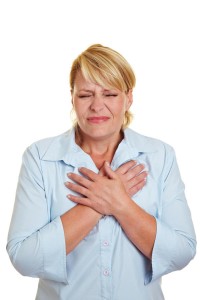Ensuring that a person is breathing takes precedence over all other first aid measures. The reason is very simple: if a person is unable to breath, he may not survive.
Disclaimer: the information posted on this page on breathing emergencies and the importance of breathing is for learning purposes only. To learn to recognize and manage severe and minor emergencies related to breathing complications enrol in St Mark James first aid and CPR classes.
Importance of Oxygen
Oxygen is a critical element that all body cells require to function; without oxygen cells die. Breathing or respiration supplies oxygen to the blood and removes carbon dioxide. It is a process wherein oxygen from the 
Chemical Processes
The human body depends on a series of chemical processes that continually convert food into energy which is necessary to fuel body cells. These body processes are known as metabolism. Oxygen is a requisite for all metabolic processes that occur within the human cells. A continuous, adequate supply of oxygen is essential to produce compounds that fuel body cells. Once these compounds are spent up or broken down, the cells would again require oxygen for the process. The energy that the cells produce are used to contract muscles, build new tissues, send nerve impulses, convert food to energy, and carry out all essential life processes. Basically, oxygen is the main source of life, without it all of these body processes will cease.
Carbon Dioxide
Meanwhile, certain metabolic processes produce waste product which is known as carbon dioxide. Excess amounts of carbon dioxide in the body can lead to harmful consequences. As the amount of carbon dioxide increases, the person may experience panting, trying to get rid of carbon dioxide. This is accompanied by an increase in heart rate and blood pressure. Brain cells may start to malfunction, with the patient becoming more restless and combative. Carbon dioxide also has a narcotic effect which can lead to hallucinations and even loss of consciousness. If not corrected, excess carbon dioxide can cause many body functions to fail which can ultimately lead to death.
Chemical Balance
Aside from gas exchange, breathing also helps maintain chemical balance in the body which is crucial for other major body processes. The body goes through many chemical processes that results in changes in the blood’s acidity. Respiration is essential in regulating the acidity of the blood. Insufficient gas exchange can cause the blood to become upset, causing cells to die.
Vital Components
The brain and other parts of the central nervous system are very sensitive to changes in oxygen and carbon dioxide levels. The brain uses around 20% of the oxygen in the body. Even a slight decrease can cause significant changes, and even cause death. Cardiopulmonary resuscitation or CPR is a life-saving technique that is taught in basic first aid courses. When given promptly and properly, it can help maintain adequate oxygen supply to the victim.